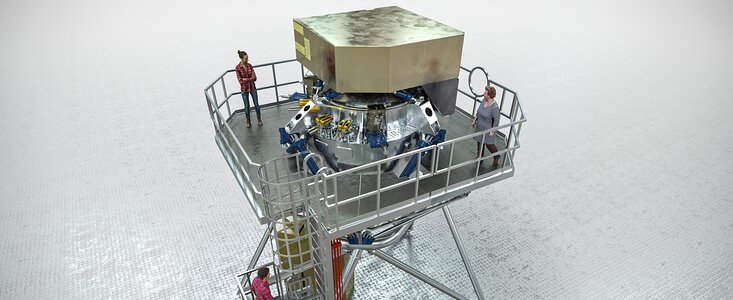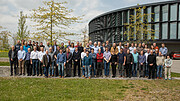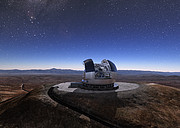Announcement
METIS Instrument Passes Design Milestone
5 June 2020
METIS, the powerful imager and spectrograph for ESO’s Extremely Large Telescope (ELT), has passed its Preliminary Design Review at ESO’s headquarters in Garching, Germany. METIS, short for Mid-infrared ELT Imager and Spectrograph, will make full use of the giant main mirror of the telescope to study a wide range of science topics, from objects in our Solar System to distant active galaxies. METIS will be extremely well suited to study the life cycle of stars, from infant stars and planet-forming discs to older stars near the end of their lifetime.
The ELT will be the largest optical to mid-infrared telescope on Earth when it starts operations towards the middle of this decade. With its 39-metre primary mirror and advanced adaptive-optics systems, it will have six times the resolution of the James Webb Space Telescope. METIS will take full advantage of this remarkable telescope and its adaptive optics to probe the structure and composition of objects with revolutionary precision.
Among others, METIS is expected to make large contributions to one of the most dynamic and exciting fields of astronomy for both scientists and the public, exoplanets. The instrument will be able to study the temperature, weather, and seasonal changes of the atmospheres of many giant exoplanets. Furthermore, METIS has the potential to directly detect terrestrial exoplanets around the nearest stars and, in favourable cases, investigate their atmospheric composition.
Now that the instrument has passed this Preliminary Design Review, the METIS consortium will continue to develop its design in further detail before construction on the instrument starts.
More Information
The METIS consortium consists of NOVA (Netherlands Research School for Astronomy represented by the University of Leiden, The Netherlands), the Max Planck Institute for Astronomy (MPIA, based in Heidelberg, Germany), the University of Cologne (Germany), the UK Astronomy Technology Centre (UKATC, in Edinburgh, Scotland, UK), the KULeuven (Belgium), the Paris Saclay research center of the CEA (French Alternative Energies and Atomic Energy Commission, France), Center for Astrophysics and Gravitation (CENTRA, University of Lisbon, Portugal), ETH Zürich (Switzerland), A* (an Austrian partnership represented by the University of Vienna, the University of Innsbruck, the University of Graz, the University of Linz, and RICAM Linz, Austrian Academy of Sciences, Austria), the University of Michigan at Ann Arbor (United States), Academia Sinica Institute of Astronomy and Astrophysics in Taipei (Taiwan), and the Université de Liège (Belgium), with contributions from ESO.
Links
Contacts
Christoph Haupt
METIS Project Manager at ESO
Cell: +49 151 14176113
Email: Christoph.Haupt@eso.org
Ralf Siebenmorgen
METIS Project Scientist at ESO
Cell: +49 1575 088 6576
Email: Ralf.Siebenmorgen@eso.org
Bernhard R. Brandl
METIS Principal Investigator
Sterrewacht Leiden, Leiden University
Cell: +31 6211 85430
Email: brandl@strw.leidenuniv.nl
Bárbara Ferreira
ESO Public Information Officer
Garching bei München, Germany
Tel: +49 89 3200 6670
Cell: +49 151 241 664 00
Email: pio@eso.org
About the Announcement
| Id: | ann20016 |
Our use of Cookies
We use cookies that are essential for accessing our websites and using our services. We also use cookies to analyse, measure and improve our websites’ performance, to enable content sharing via social media and to display media content hosted on third-party platforms.
ESO Cookies Policy
The European Organisation for Astronomical Research in the Southern Hemisphere (ESO) is the pre-eminent intergovernmental science and technology organisation in astronomy. It carries out an ambitious programme focused on the design, construction and operation of powerful ground-based observing facilities for astronomy.
This Cookies Policy is intended to provide clarity by outlining the cookies used on the ESO public websites, their functions, the options you have for controlling them, and the ways you can contact us for additional details.
What are cookies?
Cookies are small pieces of data stored on your device by websites you visit. They serve various purposes, such as remembering login credentials and preferences and enhance your browsing experience.
Categories of cookies we use
Essential cookies (always active): These cookies are strictly necessary for the proper functioning of our website. Without these cookies, the website cannot operate correctly, and certain services, such as logging in or accessing secure areas, may not be available; because they are essential for the website’s operation, they cannot be disabled.
Functional Cookies: These cookies enhance your browsing experience by enabling additional features and personalization, such as remembering your preferences and settings. While not strictly necessary for the website to function, they improve usability and convenience; these cookies are only placed if you provide your consent.
Analytics cookies: These cookies collect information about how visitors interact with our website, such as which pages are visited most often and how users navigate the site. This data helps us improve website performance, optimize content, and enhance the user experience; these cookies are only placed if you provide your consent. We use the following analytics cookies.
Matomo Cookies:
This website uses Matomo (formerly Piwik), an open source software which enables the statistical analysis of website visits. Matomo uses cookies (text files) which are saved on your computer and which allow us to analyze how you use our website. The website user information generated by the cookies will only be saved on the servers of our IT Department. We use this information to analyze www.eso.org visits and to prepare reports on website activities. These data will not be disclosed to third parties.
On behalf of ESO, Matomo will use this information for the purpose of evaluating your use of the website, compiling reports on website activity and providing other services relating to website activity and internet usage.
Matomo cookies settings:
Additional Third-party cookies on ESO websites: some of our pages display content from external providers, e.g. YouTube.
Such third-party services are outside of ESO control and may, at any time, change their terms of service, use of cookies, etc.
YouTube: Some videos on the ESO website are embedded from ESO’s official YouTube channel. We have enabled YouTube’s privacy-enhanced mode, meaning that no cookies are set unless the user actively clicks on the video to play it. Additionally, in this mode, YouTube does not store any personally identifiable cookie data for embedded video playbacks. For more details, please refer to YouTube’s embedding videos information page.
Cookies can also be classified based on the following elements.
Regarding the domain, there are:
- First-party cookies, set by the website you are currently visiting. They are stored by the same domain that you are browsing and are used to enhance your experience on that site;
- Third-party cookies, set by a domain other than the one you are currently visiting.
As for their duration, cookies can be:
- Browser-session cookies, which are deleted when the user closes the browser;
- Stored cookies, which stay on the user's device for a predetermined period of time.
How to manage cookies
Cookie settings: You can modify your cookie choices for the ESO webpages at any time by clicking on the link Cookie settings at the bottom of any page.
In your browser: If you wish to delete cookies or instruct your browser to delete or block cookies by default, please visit the help pages of your browser:
Please be aware that if you delete or decline cookies, certain functionalities of our website may be not be available and your browsing experience may be affected.
You can set most browsers to prevent any cookies being placed on your device, but you may then have to manually adjust some preferences every time you visit a site/page. And some services and functionalities may not work properly at all (e.g. profile logging-in, shop check out).
Updates to the ESO Cookies Policy
The ESO Cookies Policy may be subject to future updates, which will be made available on this page.
Additional information
For any queries related to cookies, please contact: pdprATesoDOTorg.
As ESO public webpages are managed by our Department of Communication, your questions will be dealt with the support of the said Department.




